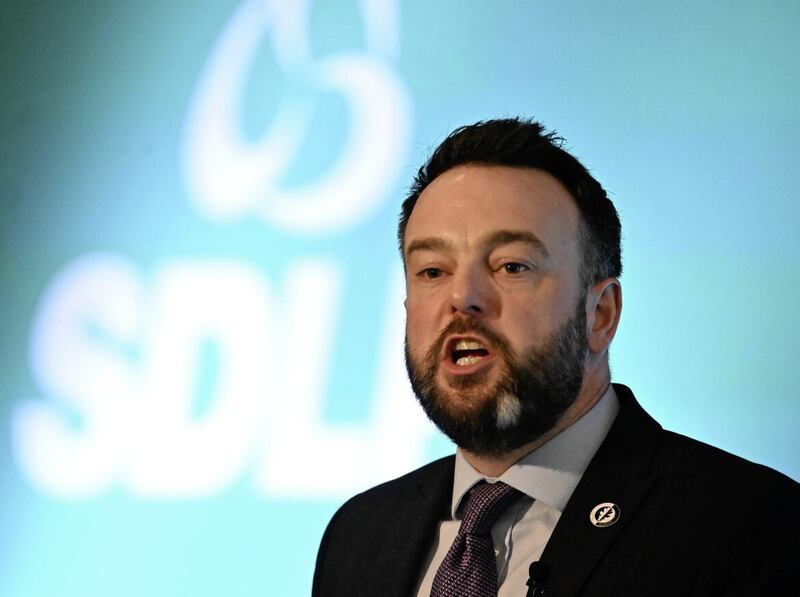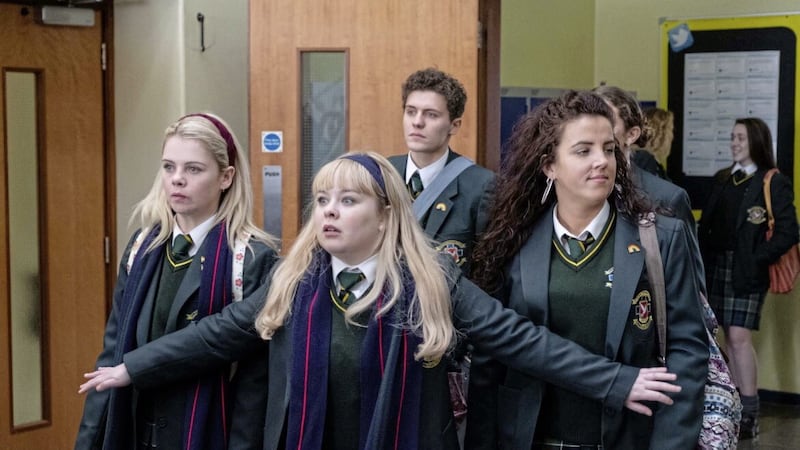We journalists have a well-earned reputation for being hard-bitten and immune to emotion. As a result, I didn't expect to be moved close to tears at last weekend's conference of the Social Democratic and Labour Party.
It wasn't a case of bawling out loud, but my eyes certainly started to well up when Dreams by The Cranberries was played at the beginning and end of the main speech by party leader Colum Eastwood.
If I had been listening on the radio it wouldn't have had the same effect, but being present at an event in Derry organised by a party formerly led by John Hume made it especially moving.
Back in 1998 I reported on the Nobel Peace Prize ceremony in Oslo, where Hume and his Ulster Unionist counterpart David Trimble were the recipients and a wonderful concert took place in the Norwegian capital by way of celebration, including Phil Collins, Alanis Morissette, the flautist James Galway, Phil Coulter from Derry and The Cranberries from Limerick, whose lead singer, Dolores O'Riordan, gave a brilliant performance. Despite her untimely passing five years ago at the age of 46, her stunning voice lives on.
Dreams is used as theme music in the TV series Derry Girls so it shouldn't be too surprising that it featured in a political event based in the same city. And what an attractive metropolis it is too, gracing as it does the banks of the River Foyle. It had a central place in the hearts of the entire island during the days of the civil rights movement which inspired so much hope, followed by the heartbreaking events of Bloody Sunday.
Eastwood is one of the better public speakers in contemporary politics but the SDLP is in a challenging situation. Having gone down from 12 to eight seats in last year's Stormont Assembly election, the party came fifth in the recent Institute of Irish Studies poll published in this newspaper, scoring 6.7 per cent – as against 30.6 per cent for Sinn Féin at the top of the list. Ironically, the SDLP’s success in promoting peaceful constitutional politics has created a situation where Sinn Féin has eaten up much of the party's vote.

Yet the atmosphere in St Columb's Hall was quite upbeat, especially in a session where South Belfast MLA Matthew O'Toole introduced a panel of contenders in the forthcoming local elections of May 18. The party is clearly delighted to have Jackie Coade, formerly a member of Alliance, running as a candidate in Craigavon.
Three years ago, the SDLP announced the establishment of a New Ireland Commission to discuss future constitutional arrangements on the island of Ireland. The party has a history of constructive thinking and, despite its currently-waning support, can still make a contribution to the debate about forms of administration that will satisfy the needs and demands of both nationalists and unionists in the times that lie ahead.
Meanwhile, in an interview with the German publication Der Spiegel, Sinn Féin president Mary Lou McDonald has said she believes a referendum on Irish unity "will come within this decade".
Asked what assurances she could give unionists about their treatment in a united Ireland, she said: "There are no circumstances under which we would stand for the type of discrimination that Catholics and nationalists suffered in the north." There would be "full and equal citizenship for everyone".
As for medical care, she said: "We need a free National Health Service for the whole of Ireland." With regard to northern membership if the EU, she said: "I am certain our international allies, our European friends, will help us navigate this path so that a reunified Ireland would re-enter the European Union in totality."
Although there is a broad political consensus south of the border in favour of Irish unity, Sinn Féin is by far the most enthusiastic proponent in Dáil Éireann and a referendum will be far more likely if SF is leading the government after the next general election.
The balance of power in southern politics is a bit strange at the moment. The coalition of Fine Gael, Fianna Fáil and the Greens has a majority of only one TD in Dáil Éireann, yet it won a parliamentary vote last Wednesday on the controversial issue of ending no-fault evictions of tenants from rented properties by 83 votes to 68, thanks to the support of Independents.
The coalition faces further challenging motions this week. Presumably they will survive, but it is not an ideal situation for them.
The next general election must be held by March 2025 at the latest and the smart money up to now has been on November 2024 for the holding of the contest, following a generous annual budget.
But Independents can't be relied upon to the same extent as members of one's own party and the lifting of the eviction ban may well be accompanied by a flood of horror stories about families rendered homeless.
Dramatic and clearly-effective action to deal with the housing shortage is needed and, if this doesn't happen, Mary Lou and her colleagues will have a field day criticising and condemning the current administration. Dramatic days could be looming.







